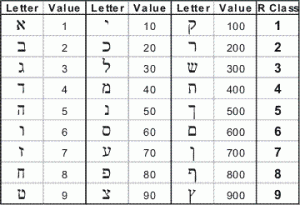Deuteronomy 26:7: “And we cried unto the Lord, the God of our fathers, and the Lord heard our cries and saw our affliction.”
When I was teaching in an academic setting, I never referred to the gematria because it is usually considered very unacademic. The Western world pretty much rejects the gematria and relegates it to that area of religion that goes off on supernatural benders.
However, it appears the Bible itself teaches the existence of a gematria. In Revelation 13:18 we are told: “Here is wisdom, let him who has understanding calculate the number of the beast.” That is, clear and simple, a gematria. I am not speaking here of numerology or something mystic like that which is practiced by the New Age movement. I am referring to a 3000 year old study by Jewish sages who assign certain numeric values to the Hebrew alphabet. From these values they seek associations between various words. Hebrew is a relationship language and part of its poetic nature is expressing these relationships in the numerical value of its letters. Unlike English which has numeric characters to express numbers such as 1, 2, 3, etc. The Hebrew has no such characters and uses letters to express its numbers. The number one is the letter Aleph, the number two is the letter Beth etc.
Let me give you an example here. Look at Deuteronomy 26:7. This is a wonderful promise. When we cry unto the Lord He hears our cries and sees our afflictions. But, soft, that is just a package that needs to be open. Open it up and you find many little gifts inside. These gifts are found when you do a word study on cry and affliction. You find more little treasures when you seek the meaning behind each Hebrew letter in each word. There is a pleasant surprise when you search out the root word and it’s historical origins. Among the many tools God has given us to study His word, you may discover the gematria to be quite valuable. After all numbers are very prominent in the Bible, we have a whole book called Numbers. Where is the Spiritual value in Genesis 6:15 where Noah is told to build the ark 300 cubits long, 50 cubits wide and 30 cubits high? I’m like in Bill Cosby’s old routine: “Right, what’s a cubit?” But who needs to know what a cubit is when you have a powerful spiritual lesson in 300, 50, and 30 or the total of 380. The Hebrew words for Egypt, thick darkness, oppressed, desolate, astonished, slip off, cast out, folly, weakness, beak off, crossroad, firmament, flock, goats and many others all have a numerical value of 380. The ark represents God freeing Noah from oppression, darkness, desolation, weakness. It represents something astonishing that God will do etc.
So let us take the word in Deuteronomy 26:7, our cry or kolenu in Hebrew. It is spelled Qof which is also the number 100, Lamedwhich is also the number 30, Nun which is the number 50, and Vav which is the number 6. This totals 186. Now let’s look for other Hebrew words that have the same numerical value. Well, the very next word our affliction is ‘aneynu which is spelled Ayin = 70,Nun = 50, Yod = 10, Nun = 50, and Vav = 6. The total numerical value of our affliction is 186. Co-incidence or God-incidence? You choose, but no doubt the words are related. Our affliction causes us to cry out.
Let’s drill down deeper. You have the Hebrew word kesalemo which means after his image. The numerical value is also 186. Ever consider the fact that God is afflicted and cries out in His affliction? Every time we sin, every time a sinner dies and goes to Hell, is not God afflicted, does he not, like a parent, feel the pains of affliction or the sufferings of His children? We are after all made in His image. So if we suffer it stands to reason we inherited that trait from our Heavenly Father.
Just look at the letter Qof itself and its spelling. It is spelled Qof = 100, Vav = 6, and Pei = 80 which totals 186. The letter Qof meansgrowth and holiness. In our crying out to God in our affliction we will grow in holiness. Did not David say in Psalms 119, “But for my affliction I would not have sought the Lord.” Affliction can be a road to holiness if we call out to God.
I’m at the end of my devotional so just one more word association. Henimesa’ has a numerical value of 186. This is an interrogative Qal imperfect form from the root masa and means can we find?
When you go through affliction, that is a good question to ask: “Can I find God in this affliction?” And may I leave you with that “Can we find God in the gematria?” You decide.








Recent Comments